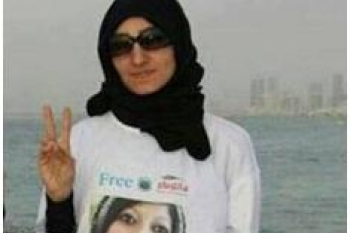Americans for Democracy and Human Rights in Bahrain (ADHRB), in coordination with the Bahrain Center for Human Rights (BCHR), and the Bahrain Institute for Human Rights (BIRD) would like to take the occasion of the International Day of Women to commemorate the position of women human rights defenders, peaceful protesters, and non-aligned medical practitioners in Bahrain and Saudi Arabia. Since February 2011, the governments of Bahrain and Saudi Arabia have persecuted women for their role in protest movements and their status as human rights defenders.
In the last several months, the Government of Bahrain has arbitrarily arrested two women human rights defenders in the country. On August 30th, Maryam al-Khawaja returned to Bahrain to visit her ailing father, Abdulhadi al-Khawaja. Abdulhadi himself is an imprisoned Bahraini human rights defender whose health had deteriorated as a result of a hunger strike. Upon arriving in Bahrain, Maryam found herself accosted by government security forces, which arrested her on charges of assaulting a government security officer. The international community widely condemned the arrest as an act of retaliation against Maryam’s peaceful advocacy for human rights in her country. Although the government would eventually release Maryam on bail and she would return to her home country of Denmark, the Bahraini government convicted her in absentia and sentenced her to a prison term.
On October 14th, Maryam’s sister Zainab al-Khawaja appeared in court on charges of insulting the king of Bahrain in relation to an event in which she tore a picture of him in half. Insulting the king carries a maximum sentence of seven years in prison in Bahrain. When she addressed the court, Zainab refused to recognize the legitimacy of the charges, stating that it was her guaranteed right to engage in peaceful political expression. She then tore another picture of the king in two, after which the judge ordered the courtroom vacated and Zainab arrested. She was later convicted of insulting the king and sentenced to over four years in prison. Zainab was previously imprisoned for a term of one year on charges also relating to the freedom of expression.
Zainab and Maryam al-Khawaja are not the only women that have been arbitrarily imprisoned or otherwise abused by the Government of Bahrain. In April 2013, Bahraini security forces arrested Rihanna al-Mosawi and Nafeesa al-Asfoor in connection with their participation in a sit-in protest against the presence of the Formula One Grand Prix. At her trial three months later, Rihanna informed the court that she had been stripped naked on two separate occasions during the period of her interrogation, and that interrogators repeatedly threatened to rape her. While visitors inside the court grew audibly distressed at this news, the judge only recorded that she had lodged a complaint of “morally improper treatment.”
During the 2011 protests, Bahraini women braved repression even as their widespread participation invited a forceful government response. They organized all-women rallies in solidarity with imprisoned human rights defenders and actively participated in society politics. Others sought to assist their fellow citizens as doctors and nurses. This last activity drew significant scrutiny from Bahraini forces, which began persecuting medical professionals like Rula al-Saffar, a professor and president of the Bahrain Nursing Society. During an episode of intense government repression in 2011, she volunteered to save lives at Salmaniya hospital, a selfless act for which she was arrested. She suffered torture at the hands of interrogators, and a military court sentenced her to fifteen years imprisonment. Released five months later on bail, she continues assisting wounded protesters and is involved in movements to free prisoners of conscience in Bahrain.
Female human rights defenders have also been persecuted by the Government of Saudi Arabia. Government security forces continue to imprison women for defying the country’s driving ban, while four Saudi princesses live under house arrest for championing women’s rights. Last September, female Saudi Arabian human rights activist Samar Badawi made international headlines with an oral intervention at the 27th Session of the Human Rights Council. Upon her return to Saudi Arabia, government security forces imposed a travel ban upon her in retaliation for her international activism, and she lives in peril of arbitrary arrest.
On International Women’s Day, we invite the international community to thoroughly examine the central role which women have played in the ongoing effort to call attention to human rights abuses in Bahrain and Saudi Arabia. We additionally call on the international community to recognize those women who have survived imprisonment and torture for the sake of their ideals, and to take positive steps towards the full realization of their rights against arbitrary detention and torture.
###
A pdf of this statement is available here.





